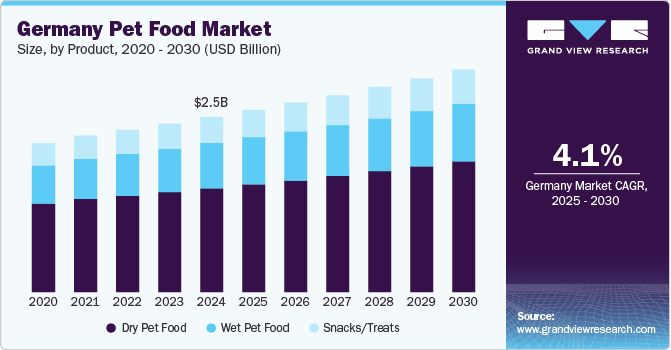Germany Pet Food Market Sees Innovation in Pet Nutrition Tech
The Germany pet food market is undergoing a steady transformation, fueled by the growing humanization of pets and heightened awareness around pet health and wellness.
The Germany pet food market was valued at USD 2.53 billion in 2024 and is projected to reach USD 3.21 billion by 2030, growing at a Compound Annual Growth Rate (CAGR) of 4.1% from 2025 to 2030. This significant market expansion is predominantly driven by the increasing humanization of pets, as German consumers increasingly view their pets as integral family members, profoundly influencing their purchasing decisions. Pet owners are shifting away from basic nutrition, opting instead for high-quality, premium food products that mirror human dietary preferences. Consequently, natural, organic, and additive-free pet foods have become mainstream, reflecting a broader cultural emphasis on wellness and comprehensive pet care.

Health and wellness trends are also playing a crucial role in boosting demand. Pet owners are becoming more cognizant of their animals’ specific dietary requirements and are actively seeking functional foods designed to offer targeted health benefits, such as improved digestion, enhanced joint health, and bolstered immune support. Products fortified with probiotics, omega-3 fatty acids, and other beneficial nutrients are gaining considerable traction. Furthermore, the rising prevalence of chronic conditions in pets, including obesity and allergies, is fueling the demand for specialized formulations like grain-free, hypoallergenic, and breed- or age-specific diets.
Key Market Insights:
- Dry Pet Food Dominance: In 2024, dry pet food accounted for a substantial 59.5% revenue share. The demand for dry pet food in Germany is driven by its convenience, extended shelf life, and cost-effectiveness compared to wet or fresh alternatives.
- Dog Food Leads by Pet Type: Pet food for dogs held a significant 59.5% revenue share in 2024. The rapid growth in dog pet food sales in Germany is attributed to increasing dog ownership across the country and the rising tendency among owners to treat dogs as family members.
- Pet Specialty Stores as Key Channel: Sales of pet food through pet specialty stores represented a 33.1% revenue share in 2024. These stores are favored as they offer a curated selection of high-quality, niche, and premium pet food products tailored to specific dietary needs and health concerns, aligning with the growing trends of pet humanization and premiumization.
- Traditional Pet Food's Large Share: Traditional pet food accounted for a large 86.3% revenue share in 2024. The growth of traditional pet food in Germany is supported by its affordability, widespread availability, and familiarity among long-time pet owners.
Order a free sample PDF of the Germany Pet Food Market Intelligence Study, published by Grand View Research.
Market Size & Forecast
- 2024 Market Size: USD 2.53 Billion
- 2030 Projected Market Size: USD 3.21 Billion
- CAGR (2025-2030): 4.1%
Key Companies & Market Share Insights
Pet food manufacturers in Germany are increasingly adopting cutting-edge food processing technologies to enhance product quality, flavor, and nutritional content. Advanced techniques such as vacuum frying, air frying, and freeze-drying are being utilized to preserve the natural qualities and essential nutrients of ingredients while simultaneously minimizing oil content.
Beyond processing, manufacturers are also integrating innovative packaging solutions. This includes the widespread adoption of resealable and biodegradable options, which collectively improve product convenience for consumers and contribute to greater sustainability. Furthermore, customization is gaining significant momentum, with brands offering a diverse range of options such as specialized seasoning blends, certified organic choices, and personalized snack and treat packs. This focus on tailored products aims to meet the varied and evolving preferences of German pet owners.
Key Players
- The J.M. Smucker Company
- Nestlé Purina
- Mars, Incorporated
- LUPUS Alimento
- Total Alimentos
- Hill’s Pet Nutrition, Inc.
- General Mills Inc.
- WellPet LLC
- The Hartz Mountain Corporation
- Diamond Pet Foods
Explore Horizon Databook – The world's most expansive market intelligence platform developed by Grand View Research.
Conclusion
The Germany pet food market is undergoing a steady transformation, fueled by the growing humanization of pets and heightened awareness around pet health and wellness. Consumers are increasingly opting for premium, natural, and functional pet food options tailored to specific dietary needs. Dry food continues to dominate due to its convenience and affordability, while dog food leads by pet type, reflecting rising dog ownership trends. Pet specialty stores are emerging as preferred distribution channels for premium offerings. Manufacturers are also embracing innovative processing and packaging technologies, ensuring quality, sustainability, and personalization remain at the forefront of market evolution.